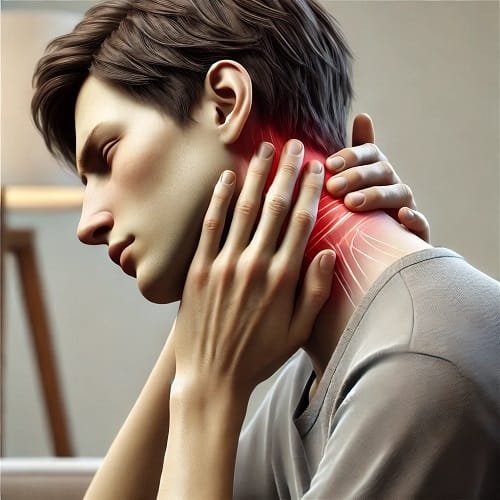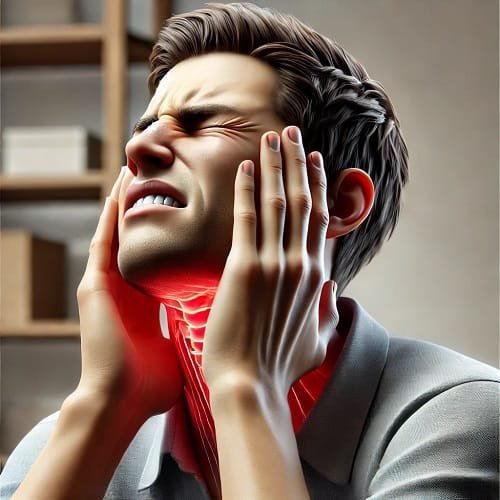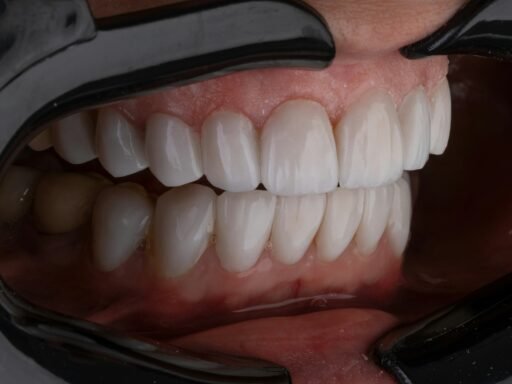Jump to Section
Introduction
Does TMJ cause neck pain? Do you suffer from neck pain and wonder if TMJ could be the cause? You’re not alone. Many people experience discomfort in their neck and are often unsure whether it’s linked to their temporomandibular joint dysfunction (TMJ). While neck stiffness, jaw pain, and headaches are commonly associated with TMJ, the connection between neck pain and TMJ is often overlooked. Understanding this link can help you find the right solution for your discomfort.
The temporomandibular joint is a complex joint that connects your jawbone to your skull, allowing for movement when speaking, eating, or making facial expressions. However, when this joint experiences dysfunction, it can lead to a variety of symptoms, including jaw pain, neck stiffness, and even headaches. The discomfort from TMJ doesn’t just stay confined to the jaw; it can radiate to the neck, shoulders, and even cause neck pain.
In this article, we’ll uncover the truth behind the relationship between TMJ and neck pain. By exploring common TMJ symptoms and how they contribute to neck pain causes, we aim to provide clarity and actionable insights into this often misunderstood issue. So, if you’ve been experiencing neck pain along with TMJ symptoms, keep reading to discover why these two may be more connected than you think!
Understanding TMJ

The temporomandibular joint (TMJ) is a vital component of your body that connects the lower jaw (mandible) to the skull, allowing for essential movements such as chewing, speaking, and swallowing. Located just in front of your ears, the TMJ is a complex hinge joint that plays a critical role in jaw function. When this joint is healthy, it allows for smooth movement and effortless jaw functions. However, when there is dysfunction, this joint can become the source of discomfort and pain.
TMJ disorder occurs when there is an issue with the jaw joint or the surrounding muscles. This can result from various causes, including injury, teeth grinding, misalignment, or stress. When the TMJ becomes dysfunctional, it can lead to several symptoms, such as jaw pain, clicking sounds when opening or closing the mouth, and restricted jaw movement. This pain may not be limited to the jaw itself; it can extend to surrounding areas like the neck, head, and even the shoulders, contributing to neck pain and stiffness.
The muscles around the jaw joint, including those responsible for chewing and facial expressions, can also become tense or strained due to TMJ disorder. This muscle tension can result in referred pain, radiating to the neck and upper back. Individuals suffering from TMJ disorder may also experience frequent headaches or facial discomfort. In some cases, the constant strain on these muscles can lead to neck pain that seems unrelated to the jaw but is actually a direct result of the jaw’s dysfunction.
By understanding how the TMJ functions and how its dysfunction can affect other areas of the body, you can start to connect the dots between jaw pain and neck pain.
The Link Between TMJ and Neck Pain

Understanding the connection between TMJ and neck pain requires a deeper dive into how the dysfunction of the temporomandibular joint can cause muscle tension and discomfort that affects the neck and shoulders. When the TMJ is misaligned or not functioning properly, the surrounding muscles can become strained, leading to a cascade of issues in areas that may seem unrelated, such as the neck.
The muscles around the jaw joint, including the masseter, temporalis, and pterygoid muscles, are responsible for moving the jaw during actions like chewing and speaking. When these muscles are overused, tense, or misaligned due to TMJ disorder, the tension can travel to the neck and shoulders. This is because many of the muscles involved in jaw movement also extend into the neck and upper back. As the muscles become strained from TMJ dysfunction, they may pull on the cervical spine, resulting in neck discomfort and neck stiffness.
One of the key issues associated with TMJ disorder is referred pain, where pain from one area of the body is felt in another. The jaw muscles and neck muscles are closely interconnected, meaning that tension in the jaw can radiate to the neck and shoulders. For instance, when there is excessive tension in the jaw due to teeth grinding or clenching, the muscles of the cervical spine may tighten as a result. This leads to neck pain, reduced range of motion, and even shoulder pain. As the muscles around the neck become strained, the cervical spine may also suffer from misalignment, exacerbating discomfort.
Furthermore, poor posture caused by the discomfort of TMJ disorder can worsen the strain on the neck and shoulders. People who are dealing with TMJ often unknowingly adjust their posture to relieve jaw discomfort, which can place additional pressure on the neck and result in long-term neck stiffness. Over time, this can significantly impact the overall alignment of the cervical spine, leading to chronic pain that is difficult to manage.
In essence, the TMJ and neck pain are intricately connected, with muscle tension and referred pain playing significant roles in how jaw issues can lead to discomfort in the neck and shoulders.
Common Symptoms of TMJ Causing Neck Pain

When it comes to TMJ and its impact on the neck, the symptoms can often be misleading, as the discomfort may initially seem localized to the jaw or face. However, jaw tension can trigger a series of other symptoms that radiate to the neck and shoulders. Understanding these symptoms is crucial in recognizing the connection between TMJ and neck pain.
One of the most common signs of TMJ that leads to neck pain is jaw pain and stiffness. When the temporomandibular joint is not functioning properly, the muscles responsible for jaw movement become tense, leading to jaw tension. This jaw tension can spread to the surrounding muscles, causing neck discomfort. Individuals with TMJ often feel a tightness in the jaw that can easily extend to the neck, especially when the jaw muscles are overworked.
In addition to jaw pain, other symptoms like headaches, ear pain, and facial pain are commonly associated with TMJ. These symptoms often radiate to the neck, making it difficult for individuals to pinpoint the source of the pain. Headaches caused by TMJ usually stem from muscle tension around the jaw and can travel up the neck and scalp. Similarly, earaches caused by the dysfunction of the TMJ can lead to discomfort that is felt deep in the neck, especially on one side of the head.
Another significant symptom of TMJ that directly affects the neck is restricted movement in both the jaw and neck. People with TMJ often experience a painful range of motion, finding it difficult to open or close their mouths fully. This can be coupled with neck stiffness, making it hard to turn the head from side to side without experiencing discomfort or pain. The muscle tension created by the misalignment of the TMJ limits the ability to freely move the neck, causing a stiffness that often leads to further neck pain.
Ultimately, these TMJ symptoms—including jaw tension, ear pain, headaches, and restricted movement—demonstrate how TMJ is intricately connected to neck pain. Recognizing these signs early can help individuals seek proper treatment to manage both their jaw and neck discomfort.
RELATED POSTS
The Ultimate Guide on How to Cure TMJ Permanently: Proven Solutions for Lasting Relief
Managing Jaw Ache During Pregnancy: A Guide for Moms-to-Be
Can Toothache Cause Headache? Understanding This Painful Link
How Long Until a Tooth Infection Kills You?
Does TMJ cause neck pain?

The connection between TMJ and neck pain is not always immediately clear, but understanding the root causes of TMJ dysfunction can shed light on why it leads to discomfort in the neck. Several factors contribute to the development of TMJ disorder, and each of them can trigger or exacerbate neck pain. Let’s explore the primary causes of TMJ and how they result in neck discomfort.
One of the leading causes of TMJ and its relation to neck pain is misalignment of the jaw, also known as malocclusion. When the upper and lower teeth do not align properly, the jaw muscles are forced to work harder to compensate for the misalignment. This constant strain on the jaw muscles can lead to muscle fatigue and tension, which then spreads to the neck and shoulders. As the TMJ becomes misaligned, the body’s natural posture may shift to alleviate jaw discomfort, putting additional strain on the neck muscles. This misalignment is often the first step in developing both jaw pain and neck stiffness.
Another significant cause of TMJ leading to neck pain is muscle overuse. Many individuals with TMJ disorder grind or clench their teeth, often unconsciously, especially during sleep. This grinding of teeth places excessive pressure on the jaw muscles, leading to tension and fatigue. As the muscles in the jaw become overworked, the surrounding muscles in the neck and shoulders often suffer from the extra strain. This overuse of the jaw muscles can cause neck tension, making it difficult to move the head freely without discomfort.
Stress is another major contributing factor to both TMJ and neck pain. People under stress often clench their jaws or grind their teeth, especially during sleep or stressful situations. This behavior can aggravate TMJ disorder, leading to an increase in muscle tension not only in the jaw but also in the neck. Stress-induced tension can manifest physically in the form of neck pain, as the body’s muscles respond to the emotional strain.
Incorporating effective TMJ treatment is essential to addressing the root causes of TMJ and preventing further neck pain. Whether it’s through stress management, dental interventions, or physical therapy, addressing TMJ early can help alleviate both jaw tension and associated neck discomfort.
How to Manage Neck Pain Caused by TMJ

Managing neck pain caused by TMJ requires a multifaceted approach that addresses both the jaw and neck discomfort simultaneously. By incorporating TMJ treatment, physical therapy, stress management techniques, and chiropractic care, you can effectively alleviate symptoms and improve overall well-being.
One of the most important aspects of TMJ treatment for neck pain is focusing on therapies that target both areas of discomfort. A holistic treatment plan can combine dental interventions, like mouthguards or bite adjustments, with physical treatments aimed at reducing neck tension. By working on both the jaw and neck, patients can experience a significant reduction in symptoms. A dentist or TMJ specialist may recommend a customized splint or night guard to prevent teeth grinding, which can worsen both jaw pain and neck discomfort.
Physical therapy plays a crucial role in managing neck pain caused by TMJ. A trained physical therapist can guide you through targeted exercises and stretches that help relieve neck tension and improve mobility. Stretching the muscles of the jaw, neck, and shoulders can reduce muscle strain, promote relaxation, and increase range of motion. These jaw exercises can also help retrain the muscles involved in chewing and speaking, alleviating excessive strain on both the jaw and neck.
Stress management is another key element in TMJ treatment. Stress is a major contributor to TMJ symptoms like teeth grinding and jaw clenching, which, in turn, cause neck pain. Practicing relaxation techniques such as deep breathing, meditation, or yoga can help reduce stress levels and prevent muscle tension from affecting both the jaw and neck. Mindfulness and cognitive-behavioral therapy (CBT) may also be helpful in managing stress and breaking the cycle of tension that leads to TMJ and neck pain.
Lastly, chiropractic care can be incredibly beneficial in aligning the jaw and neck. A chiropractor can assess your posture, spinal alignment, and TMJ dysfunction to determine the best course of action. Chiropractic adjustments can help restore balance to the cervical spine and improve neck mobility, which directly impacts the alignment of the TMJ. By addressing both the neck and jaw through chiropractic care, many individuals find relief from both neck pain and TMJ symptoms.
Incorporating these treatments—physical therapy, stress management, jaw exercises, and chiropractic care—can help effectively manage neck pain caused by TMJ and improve overall quality of life.
When to See a Doctor for TMJ and Neck Pain

If you’re experiencing persistent neck pain along with jaw discomfort, it may be time to seek medical treatment. While mild discomfort can sometimes be managed with self-care, certain symptoms indicate that professional help is necessary. If your neck pain or jaw pain is persistent, worsens over time, or becomes severe, it’s crucial to consult with a doctor or TMJ specialist.
One clear sign that professional intervention is needed is limited movement in the jaw or neck. If you find it difficult to open or close your mouth, or if turning your head becomes painful or restricted, this may indicate a more serious issue with the TMJ or the muscles around it. Additionally, if your symptoms are interfering with your daily activities or causing discomfort that affects your quality of life, it’s time to schedule a consultation.
A TMJ specialist can provide an accurate diagnosis and help treat both jaw pain and neck pain. They are equipped to evaluate your symptoms, identify the root cause of your discomfort, and suggest appropriate treatments, such as oral appliances, physical therapy, or medications to manage inflammation and pain. Depending on the severity of the TMJ disorder, medical treatments like corticosteroid injections or even surgical options may be recommended.
By seeing a doctor early on, you can receive the necessary care to achieve neck pain relief and jaw pain relief, preventing the condition from worsening.
Frequently Asked Questions
1. Can TMJ cause chronic neck pain?
Yes, TMJ can lead to chronic neck pain due to muscle tension and misalignment in the jaw. When the TMJ is not functioning properly, the muscles surrounding it become strained, causing discomfort that radiates to the neck.
2. What are the main jaw pain causes related to TMJ?
The main causes of jaw pain in TMJ include jaw misalignment, teeth grinding, and clenching. These factors put excessive strain on the jaw muscles, leading to jaw discomfort and pain.
3. How does TMJ affect the neck?
The muscle tension from TMJ dysfunction can spread to the neck and shoulders, causing neck pain and stiffness. Misalignment of the jaw can alter posture, further contributing to neck discomfort.
4. What are the best neck pain solutions for TMJ sufferers?
Physical therapy, stress management, and jaw exercises are effective neck pain solutions. Chiropractic care and dental interventions such as mouthguards also help alleviate pain.
5. How can I relieve neck tension caused by TMJ at home?
At home, try gentle neck stretches, heat therapy, and relaxation techniques like deep breathing or meditation to reduce neck tension caused by TMJ.
6. Can TMJ remedies help both jaw and neck pain?
Yes, TMJ remedies like mouthguards, physical therapy, and stress management techniques can address both jaw pain and neck pain, providing comprehensive relief.
7. Is it possible for TMJ to cause chronic TMJ pain?
Yes, if left untreated, TMJ can lead to chronic symptoms, including persistent jaw discomfort and neck pain, affecting daily life and overall health.
8. How does stress contribute to TMJ and neck pain?
Stress can lead to teeth grinding and jaw clenching, which increases jaw discomfort and causes neck pain. Managing stress is essential for reducing these symptoms.
9. Can a TMJ specialist help with neck pain?
Yes, a TMJ specialist can diagnose the condition and provide effective treatments that address both jaw pain and neck pain simultaneously.
10. When should I see a doctor for jaw pain caused by TMJ?
If your jaw pain becomes persistent, interferes with your daily activities, or if you experience restricted jaw movement, it’s time to see a doctor or TMJ specialist for a proper diagnosis and treatment.
11. Are there any TMJ remedies to reduce neck discomfort?
Yes, remedies like physical therapy, jaw relaxation exercises, and using a nightguard can significantly reduce neck discomfort by relieving jaw tension.
12. Can chiropractic care help with both jaw and neck pain?
Chiropractic care can address both jaw pain and neck pain by improving posture, aligning the cervical spine, and relieving muscle tension around the TMJ.
13. How can jaw discomfort affect the neck and shoulders?
Jaw discomfort from TMJ can cause muscle tension that radiates to the neck and shoulders, leading to stiffness, pain, and reduced mobility.
14. What are the common symptoms of TMJ affecting the neck?
Common symptoms include neck stiffness, difficulty turning the head, and neck pain caused by muscle tension from jaw dysfunction.
15. Can neck pain from TMJ worsen without treatment?
Yes, without proper treatment, neck pain associated with TMJ can become more severe and chronic, affecting posture and daily activities.
16. Are there long-term solutions for TMJ-related neck pain?
Yes, long-term solutions like consistent TMJ treatment, stress management, and physical therapy can help prevent recurring neck pain and manage symptoms effectively.
Conclusion
Does TMJ cause neck pain? In conclusion, TMJ dysfunction is more than just a jaw issue—it can lead to significant neck pain as well. The jaw muscles surrounding the temporomandibular joint are intricately connected to the muscles in the neck and shoulders. When TMJ becomes misaligned or dysfunctional, it causes jaw pain, which often radiates to the neck, resulting in stiffness, discomfort, and limited mobility. Understanding this connection is crucial in addressing both the jaw and neck pain simultaneously.
Fortunately, with proper TMJ treatment, both jaw pain and neck pain relief are achievable. Treatments like physical therapy, jaw exercises, stress management, and chiropractic care can provide effective solutions, improving the quality of life for those affected by TMJ disorder. If you experience persistent neck pain alongside jaw discomfort, it is essential to seek professional help from a TMJ specialist. Timely intervention can prevent long-term discomfort and ensure that both TMJ symptoms and neck pain are properly managed. Don’t let TMJ and neck pain interfere with your daily activities—take action and seek treatment for lasting relief.






